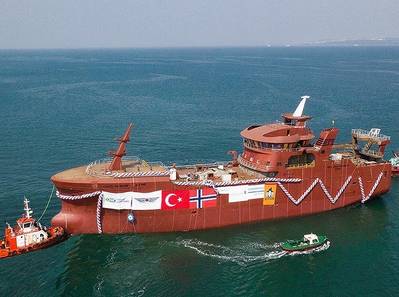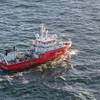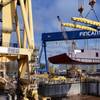Innovative Fishing Vessel Launched in Turkey
Turkey's Cemre Shipyard held a launch ceremony for the newbuild trawler Selvåg Senior being constructed for Norwegian owner Sørheim Holding.
Developed in partnership with Skipsteknisk and Selvåg AS, the 79.5-meter-long Selvåg Senior purse seiner trawler will be the third in the world to use liquefied natural gas (LNG) fuel, after the Cemre-built Libas and Sunny Lady.
Thanks to the LNG fuel system, the new trawler will adapt to the new "environmentally friendly" vessel flow by reducing carbon emissions being in accordance with IMO Tier III. Liquefied natural gas keeps a temperature of about -140°C to -160°C and must be heated to gas form to function as fuel. A cold recovery system will use the surplus energy from heating the gas to maintaining the refrigerated seawater (RSW) in the cargo tanks.
In line with the green flow, the surplus heat from the exhaust will be recycled and converted to produce clean electricity. The new Selvåg Senior is the first newly built fishing vessel in the world to adopt this technology.
A 1 MWh battery pack will be installed, replacing a diesel-powered auxiliary engine and helping to flatten the load on the main engine during the voyage and also being a power source at the port.
The vessel's electric platform is based on a "DC grid" solution that provides full flexibility in utilizing the main engine throughout its Rpm range. It can be described as automatic and more efficient handling of the vessel's alternating operating pattern and will also have major impacts on the optimization of the propeller.
In total, all measures will account for an overall reduction of greenhouse gas emissions of as much as 42% compared to whether the new Selvåg Senior would be built with conventional technology, according to the builder.
The vessel will be equipped for pelagic trawling and purse seining with pumping both over the side and the aft. All winches and fish pumps will be electrically driven and return effects will go to the battery bank.
Both the shipping company and the designer have been involved in cooperation with the Norwegian research institute SINTEF to achieve the best possible circulation and cooling of the cargo tanks. Following this, the vessel’s 12 tanks have a total volume of 2.500 m³ are designed accordingly.
The vessel to be built in accordance with the DNV GL class will carry the Norwegian flag.














